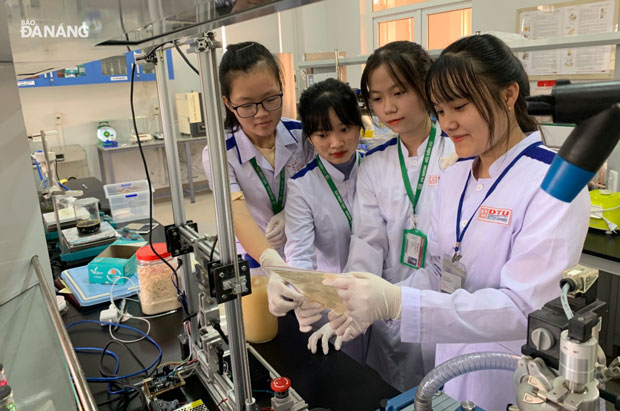Da Nang students make face masks from sugarcane bagasse
Stemming from a highly-practical idea of creating environmentally -friendly masks, a group of students from the Da Nang-based Duy Tan University has made the debut of special masks made from sugarcane bagasse- a fibrous material that meets the benchmarks of environmental friendliness, cost effectiveness.
At the recently-held municipal-level Festival 2020 for Innovative Startups, a booth owned by the Duy Tan University showcasing environmentally friendly masks made from sugarcane bagasse caught a deal of attention from visitors.
 |
| The Duy Tan University’s students holding fibers made of sugarcane bagasse |
This is a joint ‘brainchild’ by a group of five talented students, namely Nguyen Hong Dung, Vo Thi Han Chau, Nguyen Le Nhat Mai, Nguyen Thi Thanh Nga, all of whom from the Faculty of Nursing, and Phan Van Thinh from the Faculty of Business Administration, under the guidance of Dr. Le Hoang Sinh, the Director of the university’s Centre for Advanced Chemistry.
Nguyen Hong Dung, the team leader, said the creation of such environmentally friendly marks aims to promote the utility of products which are totally safe for human health, as well as raise public awareness of wearing masks in public places as a simple yet very effective way to protect themselves against potential coronavirus infections.
In reality, when it comes to troublesome waste in some foreign countries, single-use masks are considered to be the new plastic bags, as many of them don't go to landfills and instead, end up on hiking trails or beaches, hereby causing havoc on the environment.
Disposable plastic masks that end up in the oceans could take up to 450 years to decompose, according to campaign group Waste Free Oceans.
That concerning matter prompted Da Nang students to come up with a public-hailed idea of making eco-friendly, easily biodegradable and compostable masks hailed as an sustainable alternative for staying safe during the coronavirus pandemic.
It is clearly seen that sugarcane bagasse can be used as biofuel, for pulp and building materials, and as a replacement for paper and foam takeout containers, but there are no face masks made from the fibrous material going to sale at present. This, indeed, inspired Da Nang students to manage to bring their idea into fruition as soon as possible.
The Duy Tan-created masks are very pleasant to wear and easy to breathe in, and it was easy to adjust the fit, with a very handy toggle function on the ear, especially softer on the skin, and therefore less likely to cause irritation.
Early next year, Da Nang student makers of face coverings will make some adjustments to their product for its perfection and send it to Vietnamese Ministry of Health for appraisal and assessment, paving the way for mass production later.
Deputy Director of the Startups Centre at the Duy Tan University Nguyen Huynh Linh pledged all favourable conditions would be created to bring Da Nang students' product closer to the general public in the time to come.
By XUAN DONG – Translated by A.T








